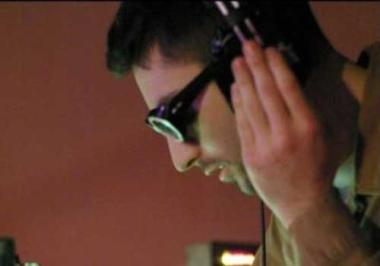Justin Coen joined his first band at age 13 while growing up in Springfield. After that, he "played in a slew of rock bands," put out some albums and toured around the States and Canada. But what he loves most isn't power chords or loop pedals—it's turntables and vinyl.
Coen, 24, has been a working DJ since he was in high school. "My brother bought a set of turntables and left them in my parents house," he said. "I assumed since I had the records, I should start DJing."
Coen is known at his gigs as Studebaker Hawk, a name he borrowed from a late-'50s sports car, referenced by Frank Zappa in "Billy the Mountain." Seems obscure? That's Coen's specialty. Like many musicians, he offsets the cost of perfecting his art by working odd jobs—in his case, dealing rare records.
"I quit my day job when I realized I was making more money selling records," he says with a laugh, explaining that most people throw great dance music in the dollar bin when they're actually worth 10 or 20 times that to the right buyer. "You'd be crazy not to see something and try to flip it," he adds.
Currently, Studebaker Hawk is working the local scene. He has regular gigs at The Rendezvous in Turners Falls and at Union Station in Northampton. But only a short time ago, he was working a very different scene—Barcelona, Spain.
"People in Barcelona DJ like people join bands in the U.S. I had more of a following there after my first gig than I've ever had in Northampton," he said.
So why leave? "The biggest reason was that I ran out of money," he says. "And I promised a friend that I'd deejay her wedding."
While he was abroad, Coen got an enthusiastic response to his preferred style, Italo disco. Italo, which emerged in the late '70s, is hard to define, says Coen, but describes it as "over-the-top, synthesized dance music." "If you heard it you'd think '80s and dance music, but it's not the same. It's not as high-energy," he said.
For Studebaker Hawk, energy is essential to creating the right feeling at a gig. He doesn't usually start with a bang. Instead, he begins with low-energy Balearic music, which is a slow house style that came from the island of Ibiza.
"It's not really about getting people to dance—it's more to set the mood," he says. "If I came into the club, I'd want to think, 'Wow, in an hour or two, this place is going to be nuts!'"
And that's the goal, he says: go nuts and take your audience with you.
"Good DJs make you forget all your inhibitions," Coen says. "It's more of an emotional thing, even if you wouldn't think to describe it like that."
He says it can be hard to get the energy mix exactly right.
"I know a lot of DJs who peak early and you think, 'Wow that's the peak and now it's gone,'" he said. "I'm generally still striving to take them higher at the end of the night."
Not only is it hard to decide which tracks to play when, it's physically taxing to play them. "I'm constantly tweaking the speed of the tracks," says Coen, who plays with two turntables at a time and taught himself to beat-match—synching the tempo of two or more songs so that they blend together—during his first radio show.
Coen readily admits that he's still got work to do on his craft ("There are a hell of a lot of DJs who have more confidence than me," he says, laughing), but for a 20-something, he's got a lot of experience—and he's full of advice to prove it. "Never DJ in direct sunlight," he says, telling a story about a record-melting experience at an outdoor venue. "I've lost a lot of tracks that way."
He also suggests that for an aspiring DJ, one of the best things to do is get your own radio show on a local station, if you can. Coen had a weekly show on WXOJ for two years before moving to WMUA.
"It forces you to play hours of what you want to play, every week. Too many DJs give in to audiences and don't present the show that they feel passionate about," he says, citing half-hour or hour-long time limits on DJ sets at some clubs. "When playing for an extended period, it gives you more freedom to really tell a story and move in different directions."
Though Coen admits that Western Mass. isn't the best scene for dance music ("New York is really where it's at"), at the moment, he has space to present his passion locally. He's excited about the gigs at The Rendezvous ("It's all about the artist up there," he says) and he loves playing "afternoon tea dances" (a tradition started in the gay community in England that traveled to the States by way of Fire Island) at Union Station because it's a "cool thing to do in a place with a big gay community."
Things are working for Coen right now, but he's honest about his career choice: "I don't truthfully think I'll ever become wealthy from DJing what I love," he says. "To become a known DJ& I will have to move back to a big city, and travel the world playing for audiences who are interested in what I play." But, he says, he "may be doing that within a few years."
Studebaker Hawk plays with fellow WMUA DJ Mike Barrett at the Sweet Dynamite party at The Rendezvous, 78 3rd St., Turners Falls, on Sat., Sept. 12, 9 p.m.-1 a.m., free, 21-plus. He also plays every third Sunday of the month at Union Station Ballroom, 125A Pleasant St., Northampton, 3-7 p.m., $5/student, $8/general, 18-plus.



